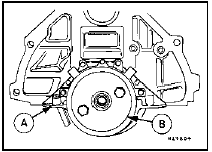Crankshaft rear oil seal - renewal
Note: New flywheel/driveplate bolts must be used on refitting.
1 Remove the flywheel/driveplate and the engine adapter plate.
2 Extract the seal using an oil seal removal tool if available. It may also be possible to remove the oil seal by drilling the outer face and using self-tapping screws and a pair of grips.
3 Clean the oil seal housing, then carefully wind a thin layer of tape around the edge of the crankshaft to protect the oil seal lip as the seal is installed.
4 Ideally, the new oil seal should be installed using a tool similar to that shown (see illustration).

24.4 Tool used to fit crankshaft rear oil seal
A Rear oil seal housing B Special tool
A suitable tool can be improvised using a metal tube of suitable diameter, a metal disc or flat bar, and two flywheel bolts. Draw the seal into position using the two flywheel bolts. Make sure that the seal lip faces into the engine.
5 With the oil seal installed, carefully pull the tape from the edge of the crankshaft.
6 Refit the engine adapter plate and the flywheel/driveplate.
See also:
Bulbs
Replacing exterior bulbs
Check the operation of all the bulbs frequently.
Using the right bulbs
Replacement bulbs are specified in the chart below. Headlamp bulbs
must be marked with an authorized ...
Seat belts - removal and refitting
Front seat belt stalk
1 Remove the front seat.
2 Detach the seat belt stalk from the seat by
removing the two Torx screws.
3 Refitting is a reversal of removal.
Front seat belt assembly
4 Where ...
Steering column - removal and refitting
Removal
1 Set the front wheels in the straight-ahead
position.
2 Disconnect the battery negative lead.
3 Remove the driverís side lower facia trim
panels.
4 Remove the screws and withdraw the
s ...
